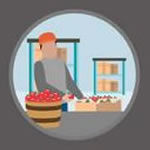
Last month I attended the association for operations management (APICS) conference in Las Vegas. It’s been a while since I exhibited at that show — partly because trade shows in general have been slipping downward on a slow decline since the early 2000s. Trades shows have always been a great way for companies like us to meet customers and prospects face-to-face and hear from the "horse's mouth" the issues that businesses are facing in the real world, every day.
APICS typically was considered a manufacturer's manufacturing show. In past shows that I've attended, the aisles and sessions were chock-full of attendees from big manufacturers, large metal-bending companies, and jobs shops. All kinds of companies related to, or associated with, the auto industry. That's what I expected to see again at #APICS2015.

Much to my delight, I actually saw reinforcement — as exhibited by show attendees at this year's APICS conference — of the trends happening in our daily business: the diversification of industries who want to learn more about improving their supply chain business.
At xTuple, we talk to and work with lots of companies on the growth end of the spectrum, from established startups to ramp-ups to crossing-the-chasm explosive expansion. This is the time they come to us looking for solutions to help them manage their business.
Speaking of diversification, the number of customers entering the Specialty Foods* market sector, for example, continues to increase. It's a phenomenon which emerged a fews years ago here at xTuple when we started to used our own data to learn more about our customers. We saw a lot of customer growth in the food segment, and the numbers keep growing.
A Specialty Food Association** industry study reported in Food Manufacturing pointed out that the Specialty Food segment has blown by $100 Billion mark, with a growth rate of 19%. With growth rates of overall food at only 2%, companies of all sizes — especially small and medium businesses — are jumping into this segment. You expect the big guys to play here, but it's the niche players that are defining this market. Millennials are a driver here, and all signs point to consumers of all ages are looking for new and healthier options.
By all accounts, APICS is keeping pace with the trend. As it has since it began back in the 1950s, APICS is a resource that manufacturing companies turn to. And if it’s happening within APICS, it's happening all over the United States. Specialty Food manufacturing is on the rise!
Some around the world call this re-emergence of lots of small niche manufacturers (food and other industries) the rise of artisanal manufacturing. According to the US Census Bureau, over 75% of U.S. manufacturing firms employ 20 or fewer employees. Although these firms make up only 9% of U.S. manufacturing jobs, they are by and large the types of businesses that have been growing and creating jobs since the recession.
I recently found this really great portal for “America’s best factories in one place” called Maker’s Row — which enables brands to find manufacturers to create products here in the U.S. According to their mission, they wanted to “...make the manufacturing process simple to understand and easy to access. From large corporations to first time designers, we are providing unparalleled access to industry-specific factories and suppliers across the United States.” Today, they are helping over 80,000 businesses connect with American manufacturers. They've even created an online store to showcase products made on Maker’s Row and made in America.
Interesting quote from this BBC report on U.S. manufacturing: "We don't have the mass market mentality in the U.S. anymore," says Professor Jeff Cornwall, a professor of entrepreneurship at Nashville’s Belmont University, as consumers increasingly focus not just on cost but on quality and a sense that the products they buy should be ethically manufactured and locally sourced.
Sounds like "specialty" manufacturing of all types is alive, well, and growing, here in America. And the APICS show helped solidify that message with me. We look forward to even greater participation with the #APICS2016 conference in Washington, D.C.
* Specialty foods are typically considered to be unique and high-value food items made in smaller quantities (or batches) from high-quality ingredients. Compared to staple foods, specialty foods may have higher prices due to more expensive ingredients and labor.
** The Specialty Food Association is a thriving community (3,000+ members in the U.S. and abroad) of distinctive food artisans, purveyors, importers and entrepreneurs. The Association produces the Winter and Summer Fancy Food Shows, and is a leading source of information about the $109 billion specialty food industry.
